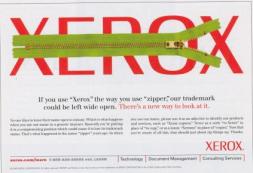There’s a whole lotta dilution goin’ on. That’s why this weekend is Trademark Dilution Weekend. Today: XEROX and GOOGLE. Tomorrow: the Ninth Circuit’s amended decision applying the “new” Trademark Dilution Revision Act standards in Jada Toys v. Mattel, Inc.
 The Afro-IP blog, all the way from South Africa and the United Kingdom, apparently follows U.S. politics pretty closely, because yesterday it latched onto a phrase Hilary Clinton used in her Feb. 21 debate with Barack Obama. She reportedly called him the candidate of “change you can Xerox.” Ms. Clinton’s line reportedly drew boos from the audience, but probably not because of its implications on Xerox’s well-known brand.
The Afro-IP blog, all the way from South Africa and the United Kingdom, apparently follows U.S. politics pretty closely, because yesterday it latched onto a phrase Hilary Clinton used in her Feb. 21 debate with Barack Obama. She reportedly called him the candidate of “change you can Xerox.” Ms. Clinton’s line reportedly drew boos from the audience, but probably not because of its implications on Xerox’s well-known brand.
Afro-IP points out that Ms. Clinton’s statement — now re-published in headlines around the world — is something of a setback for Xerox Corp., which has campaigned against the public’s using its trademark as a noun or verb for fear its mark will become generic. (In October, STL discussed a Xerox anti-genericide advertisement here.)
 Afro-IP states: “To date, the Xerox company has provided a successful example of a company which was able to prevent the genericide of its core trademark through an extensive public relations campaign advising consumers to ‘photocopy’ instead of ‘Xeroxing’ documents (the brand did become generic in Russian, Bulgarian, Portuguese and Romanian though). The Xerox company also has extensive operations in Africa, where its customers will be tuning into the US election extravaganza.”
Afro-IP states: “To date, the Xerox company has provided a successful example of a company which was able to prevent the genericide of its core trademark through an extensive public relations campaign advising consumers to ‘photocopy’ instead of ‘Xeroxing’ documents (the brand did become generic in Russian, Bulgarian, Portuguese and Romanian though). The Xerox company also has extensive operations in Africa, where its customers will be tuning into the US election extravaganza.”
While Ms. Clinton’s comment isn’t going to turn a protectable trademark into a generic one, it must be giving Xerox’s branding people fits.
The Illinois Business Law Journal reports this sort of thing is what Google Inc. has been trying to avoid. It recently published a nice article chronicling that company’s efforts to hold on its trademark rights. Here’s its take on two events from 2006:
 “In early 2006, a television commercial for Pontiac automobiles urged viewers to ‘Google ‘Pontiac’ to find out’ more. Curiously, Google did not object to the commercial’s usage of ‘Google’ as a verb, even though the infraction seems similar to various other instances that prompted a letter from Google’s attorneys. Indeed, Google essentially consented to the commercial’s usage of ‘Google,’ since Pontiac contacted Google to obtain permission for use in the ad. This particular instance of generic use may be especially damaging to Google, since their consent to the use is similar to that of the Otis Elevator Company, which weighed heavily in the finding of genericness. However, Google might successfully argue that the video of the commercial included images of the Google search page being used, reinforcing the public’s understanding that the phrase ‘Google ‘Pontiac’ to find out more’ means use of the Google search engine.
“In early 2006, a television commercial for Pontiac automobiles urged viewers to ‘Google ‘Pontiac’ to find out’ more. Curiously, Google did not object to the commercial’s usage of ‘Google’ as a verb, even though the infraction seems similar to various other instances that prompted a letter from Google’s attorneys. Indeed, Google essentially consented to the commercial’s usage of ‘Google,’ since Pontiac contacted Google to obtain permission for use in the ad. This particular instance of generic use may be especially damaging to Google, since their consent to the use is similar to that of the Otis Elevator Company, which weighed heavily in the finding of genericness. However, Google might successfully argue that the video of the commercial included images of the Google search page being used, reinforcing the public’s understanding that the phrase ‘Google ‘Pontiac’ to find out more’ means use of the Google search engine.
“In mid-2006, Merriam-Webster’s Collegiate Dictionary added the term ‘Google’ as a verb. However, the dictionary’s lexicographers were sensitive to Google’s attempts to protect its trademark, and crafted the entry accordingly: ‘to use the Google search engine to obtain information about (as a person) on the World Wide Web’. The induction into Webster’s dictionary was marked by an article in the Washington Post, which drew a cookie-cutter letter from Google’s trademark lawyers. Like its previous letter to Word Spy, this response This in turn sparked cries of outrage and disappointment for Google’s apparent lack of humor.”
So, what’s the future hold for Google’s mark? The Illinois Business Law Journal thinks it will remain protectable as long as Google remains vigilant in protecting it against everyday use — like Ms. Clinton’s use of XEROX.
Photo credit: Reuters/Jessica Rinaldi (Democratic debate)